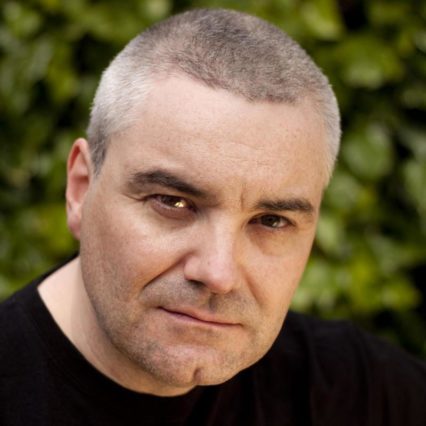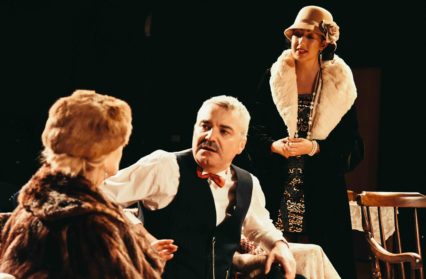Lewis Davies reviews the Fluellen Theatre Company’s production of Philip Burton’s Granton Street, a play about a politically evolving town in Wales.
Philip Burton was working as a teacher in a secondary school in Port Talbot when he wrote Granton Street in the late 1920s. It received a first production at Aberavon New Hall (a theatre that no longer exists) with the YMCA players in October 1934 and received a good reception winning a national drama prize. It also became the first play to be broadcast in English by the emerging BBC Wales radio drama department in 1937. It is a play with a history and is of significance to the tradition of Welsh stage drama. It has not been performed on the stage since its first show and it has taken a remarkable leap of faith by the innovative Fluellen Theatre Company and its director Peter Richards to revive it with a full professional touring production.
The play opens on the eve of by-election in the mining town of Abernansant in the front room of Tom Davies, a leading figure in the miner’s federation and a life time campaigner for the rights of the working class. Tom is the head of a tidy and well-ordered household, he has a wife and three children. One son, Will, is down the pits with him and ingrained with socialism and dust, there is a daughter at home who is seen but rarely heard whilst the oldest son John is about to return from medical school where he has finished his exams and about to graduate. The by-election is a topic of concern for all in such a political household and the arrival of John, soon to be graduating and soon to be contributing to the family who have sacrificed so much for his education is only to be welcomed and heightens the sense of occasion.
But everything is not right in the house of Davies. His brother-in-law, Uncle Jim, a jobless but charming drunkard is campaigning for the opposition, Mr Granton, the Conservative candidate. Then John announces he’s been offered a research post at the university as “Assistant Demonstrator of Pathology”. Research is all very well but “How long will it be again before you’re out in a proper job”. There’s no money in research. But John is having his own doubts on the road to Port Talbot, he’s thinking he might be turning into a Liberal, his brother is aghast. “I can respect a strong conservative but a Liberal… he’s a man who wants to be a conservative but is prevented by what remains of his conscience.”
The story so far is a story with plenty of resonance for modern Wales where the political lines have until recently been strong and stable. But change is afoot and in Granton Street it comes with the revelation that John in addition to finding a job has found love with an arts student at college. The woman is Sybil Granton, daughter of the mine owner whose street they are all living in. This is the driver for much concern about standards and class consciousness, social mobility and expectations raised through education. It feels very modern Wales.

This is all admirably dramatized by Burton as well realised in this production by a talented cast. Nia Trussler Jones produces some brilliant comic timing as Mrs Davies against the stern sobriety of her husband Tom (Christopher Pegler-Lambert); and Claire Novelli makes a late but forceful dramatic entrance as Mrs Granton torn between the love for her politician husband, icily and convincingly played by Rob Stradling, and her forceful daughter, Sybil. The skill of the writing provides enough motivation and journey for all the actors to succeed in their own personal journeys with the quiet sister played by Georgia Griffiths and James Scannell playing Will, providing excellent support to the leading story of Sybil (Danica Swinton) and John’s (Simon Peter Ancellon) cross class romance.
The ace and joker in this house of cards is the ragged trousered philosopher, Uncle Jim, brilliantly played by Andrew Lennon in a performance that perfectly captures the uneasy uncertainties of the play, the black sheep of the Welsh family, a drinker, a conservative campaigner but only for the money and because they asked him first. A man who can see three sides of every argument. From his first entrance, drunk, funny and perceptive, Jim offers a rare, fascinating view into the concerns of a non-working man embedded within the culture of south Walian life but never quite fitting.
It could be a sympathy of the outsider that Burton himself felt. Although he was born into a mining family, after the early death of his father in an accident he was fortunate enough to be sponsored by a local headmaster through Cardiff University and from there into teaching and drama. But he would leave teaching in 1945 and find his way in the professional world of stage and radio drama first in Wales and then to the United States in the early 1950s where he settled and eventually became a US citizen. He had a serious influence on the development of Welsh drama and the popularisation of Welsh themes for a British audience and this play is a reminder of his talent.
The historian Angela V John, who has provided an illuminating introduction to the play in a first publication of the script Granton Street: A Play in Three Acts by P.H.Burton, reveals that the writer set himself the task of creating a play within a three act structure in one place with no scene changes over the course of two days. The production by Fluellen ably emphasises the strength of this unity of purpose. The set is minimal, the dress convincing. The cast walk straight out of the past. It’s an illuminating reminder after recent theatrical spectacles that a well-constructed well-written play echoes and emphasises the original rules of drama. The actors revel in a fine ensemble piece, the dialogue is tight, funny and revealing, with sharp direction by Richards, this is a real find, a rediscovery of a forgotten classic in the tradition of Welsh drama.
(Image credit: Huw Richards)
For more information on the Fluellen Theatre Company visit their Twitter.
Richard Lewis Davies is a publisher and writer. His short story, The Stars Above the City appears in Queer: An Anthology of Gay, Lesbian and Transgender Fiction from Wales edited by Huw Osborne and Kirsti Bohata to be published in 2020.











